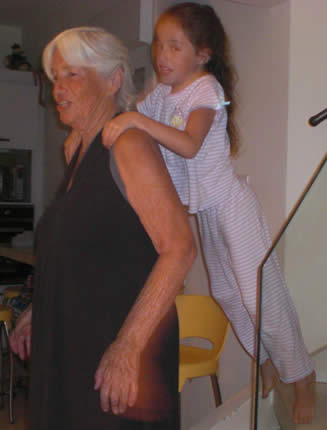|
InteGRATion into
GRATeFULLness
Singing&Sounding keeps me Sound
| 2007_10_25-
Song 2011_08_?- Masterchef 2011_09_10-11- MIKA with Grandma at Shoham |
Masterchef
- 35th page: Program 14 "In the Supermarket" slow-motion sequence A |
I,
Christa-Rachel, Immanuel's mother, have been healing, learning and creating through "Healing-K.i.s.s." since 10 years. That it was erased on..... Christmas 2008 was a sign: "no longer create new pages! but add new creations to existing pages! [up to maximum 1300 KB size per page]" The purpose was revealed only N O W: Humankind is p a s s i n g from linear time and separateness to spherical 'time' and ONEness! |
Lili Marleen
dedicated to
my father Siegfried Guth,
who must have heard Marlene Dietrich in Sicily
before he was killed around August 5, 1943
| 2007_10_25 Vor der Kaserne, vor dem grossen Tor |
lyrics:
Hans Leip 1915 soldier in World War I |
tune: Norbert Schultze, 1939, the year I was born |
|
| Sung in German during World War II another version by Lale Anderson Sechste Panzergrenadierdivision most famous:
by Marlene Dietrich by the Heyn Quartet
|
sung in English during World War II Translation by Tommie Connor, 1944 2. Time would come for roll call, 3. Orders came for sailing, 4-5. Resting in our billets, |
4. Well she knows your foot steps, 5. From my quiet existence, |
The Story - in German and in English - excerpts from the Lili Marleen Official Site
| Es war bestimmt das Lieblingslied aller Soldaten
des Zweiten Weltkriegs. Lili Marleen wurde die inoffizielle Hymne der
Soldaten an sämtlichen Fronten.
Der Urtext dieses Liedes, "das Lied eines jungen Soldaten auf der Wacht" stammt von Hans Leip, einem deutschen Soldaten des ersten Weltkriegs. Es wird behauptet, daß dieses Lied in mehr als 48 Sprachen übersetzt worden ist: u. A. ins Französische, ins Russische, ins Italienische und Hebräische. In Jugoslawien genoß auch Tito dieses Lied sehr. Es wurde sowohl in den Lazaretten gesungen, wie auch anhand von Riesenlautsprechern, zusammen mit Propagandamaterial, über die Fronten in alle Richtungen geballert. Marlene Dietrich brachte "Das Mädchen unter der Laterne" per Radio an die Öffentlichkeit und "für drei lange Jahre in Nordafrika, Sizilien, Italien, Alaska, Grönland, Island und England" wie sie später erläuterte. Lili Marleen ist ganz gewiß das populärste Kriegslied aller Zeiten. Das Thema von der Sehnsucht nach dem Liebhaber ist weltumspannend. Weshalb ist dieses Lied so populär? Das letzte Wort hierzu überlassen wir Lale Andersen selbst: "Kann
denn der Wind erklären, warum er zum Sturm wurde?" |
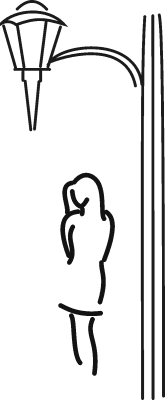 |
Surely the favourite song
of soldiers during World War II, Lili Marleen became the unofficial
anthem of the foot soldiers of both forces in the war.
Original German lyrics from a poem The Song of a Young
Sentry by World War I German soldier, Hans Leip It was sung in military hospitals and blasted over huge speakers, along with propaganda nuggets, across the frontlines, in both directions. Marlene Dietrich featured
The Girl under the Lantern in public appearances, on radio and "three
long years in North-Africa, Sicily, Italy,
in Alaska, Greenland, Iceland, in England," as she later recalled. Lili Marlene is easily the most popular war song ever.
Its theme of dreaming for one's lover is universal. Why is the song
so popular? The last word goes to Lale Anderson : "Can the wind
explain why it became a storm?" |
| "By
chance" and not at all connected with my research on "Lili Marleen"
I came across a video today, "Shir la-khofesh", "Song to Freedom", which is dedicated to Israeli soldiers, who have been either "absent" for many years, or were abducted before the second Lebanon War 2006, and are still not free. Listening to the song while watching those soldiers' photos, I find that both, lyrics and tune, are beautiful, but they convey the common feeling of "we are victims", in this case: victims of the darkness "khoshekh" and obviously cannot have freedom "khofesh". |
 |
translated into French Devant la caserne Et dans la nuit sombre Le temps passe vite La vieille lanterne Cette tendre
histoire |
translated into Italian sung by O trombettier Prendi una rosa Quando nel fango Se chiudo gli occhi |
Enjoying not only the song itself, A
very sad parody, an anti-Hitler version, |
| Finnish:
Kerttu Mustonen 1942
Kasarmimme eessä suuri portti on, Huomas kaikki heti, meitä katsoessaan, Iltahuudon hetki liian pian sai, vois tulla kallis retki, Askeleesi siellä, kauniin käyntis myös, Kaikki sumuun häipyy, maa ja taivaskin, |
Dutch:
Herre de Vos, 1940
sung by Onder de lantaren, bij de groote poort, Onder de lantaren, heel dicht bij elkaar... Onder de lantaren, werd een sein gehoord, Onder de lantaren, loop jij nu mijn kind... |
| Danish
text to this tune På den stolte skude fjernt fra hjemmets strand står den tavse sømand og længes hjem i land. Tænker, mens skibet står mod nord, på den, som i hans hjerte bor, på sin Lili Marleen, kun om Lili Marleen. Det var på en knejpe Det var kærlighed ved Og når fra det fjerne |
Some
Spanish text to this tune Al salir de España Sola se quedó, llorando mi marcha La niña de mi amor. Cuando partía el tren de allí Le dijo así mi corazón: Me voy pensando en ti, Adiós, Lili Marlen. Aunque la distancia Cuando vuelva a España |
Chilean text to this tune
Cuendo llega un parte y debo marchar Si en el frente me hallo, lejos, ay! de ti
See also a Russian version by Iosif Brodsky |
![]()
 |
RE-Creation-in-slow-motion Masterchef Israel Summer 2011 |
 |
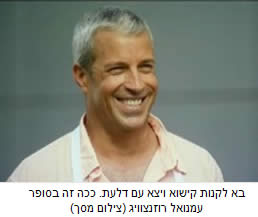
This image from an irrelevant
article may serve as
promo to Immanuel's part in the Supermarket-progam
read from right to left
Chaim:
 |
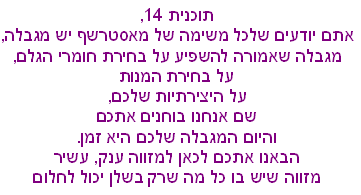 "You know that each of the Masterchef's assignments has a limitation, a limitation which is meant to have an influence on the choice of the raw materials, on the choice of the dishes, on your creativity, that's where we test you And today your limitation is time. [coincidence: I'm translating this on Sept. 14, 2011, see what I wrote in Heaven-to-Earth today] I brought you here to a gigantic, rich pantry a pantry in which there is everything that only a cook can dream about" |
 |
 |
 |
 |
"The time Alisa: |
 |
 In the studio we'll give you 1 1/4 hours to cook |
 |
 |
 |
"Go and find yourself there" "The hard part is to decide "Now think!" |

|
 |

|
 |

|
 |
 |
 |
 |
"I'll probably prepare poulty with sweet potatoes" |
 |
 |
 |
"There is a challenge in this, |
Rachel: |
 |
"... I build the dish while running" |
 |
"Honey... |
 |
"Immanuel and Sima, |
 |
 "And then I certainly remember, wai, I forgot" |
 |
 "I have what I need, now I improve (???)" |

"Immanuel and Sima , your time is finished"
 |
 |
 |
 |
 |
 |
 Chaim: "You didn't really think we would let you prepare just one dish in an hour and a half ".... |
 |
 |
"So, instead of preparing one dish, "You still have a whole hour |
 |
 |
to
the
|
 |
2011
 |
En-JOY-ing
and growing with Mika and my Family following the documentation "Mika's Heaven on Earth", inserted since Song Game 2007_01_01 |
 |
Shoham, Shabbat-Eve till Sunday early morning, September 10-11, 2011
continued
from SongGame 2007_10_24
I intended to document ,
how this song is sung and played with Mika nowadays, when her time has come to go up to her room and sleep.
What Elah and Alon could not experience, was the thrill of jumping on Savta from the third step of the staircase.
Efrat succeeded in catching the jump only on one of the 4 photos, where Mika's feet are seen in the air,
and my face shows the pressure of not letting us fall, neither me nor her.
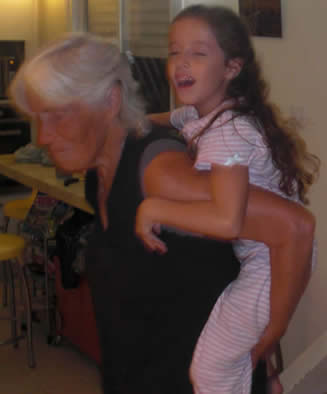 |
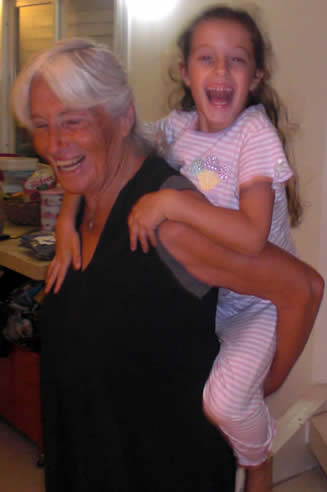
|
|
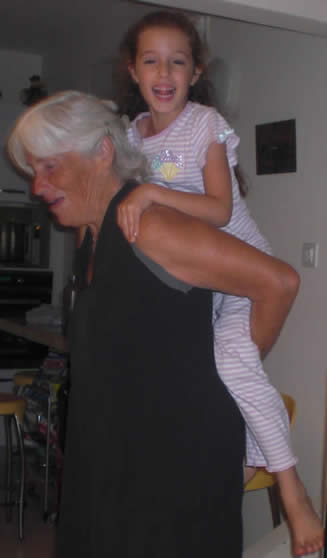 |
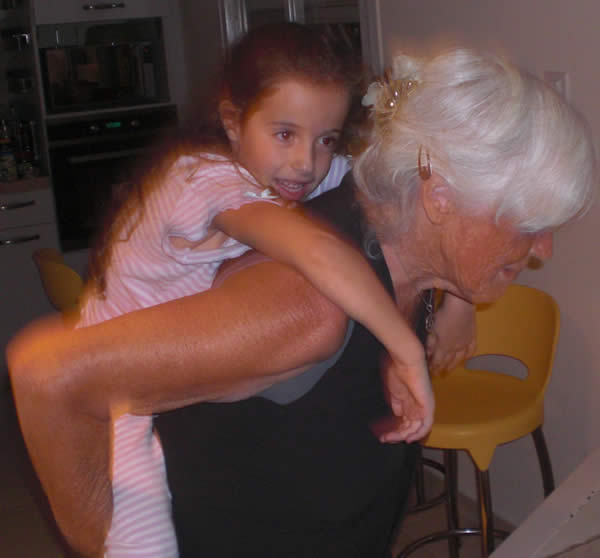 |
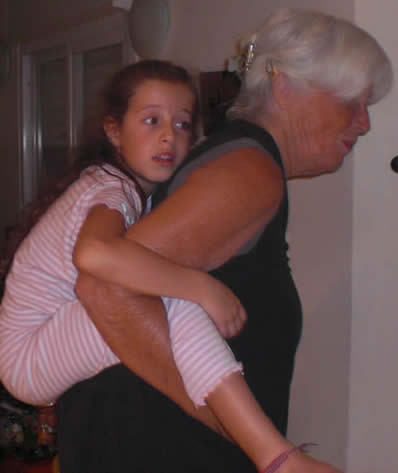 |
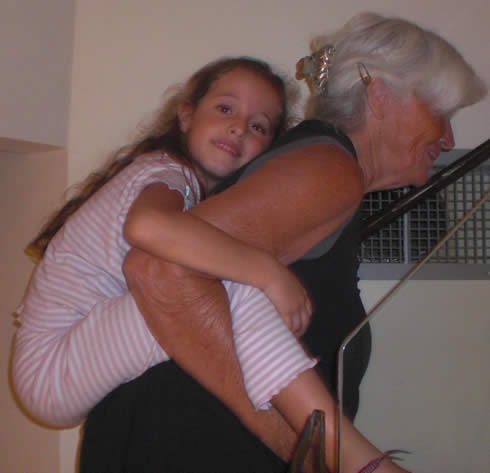 |
Shoham, Sunday, September 11, 2011
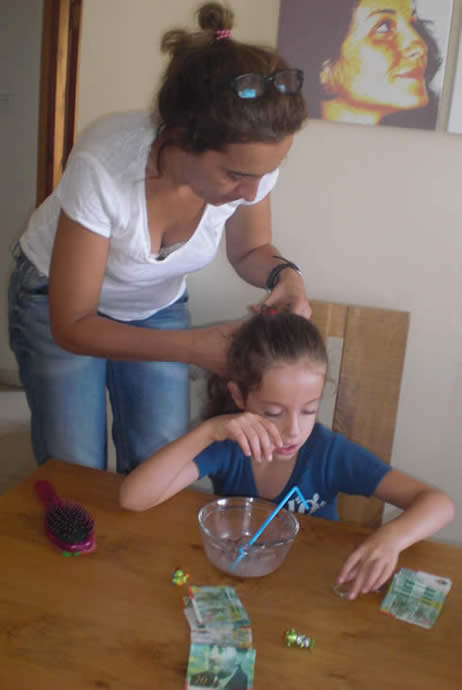 |
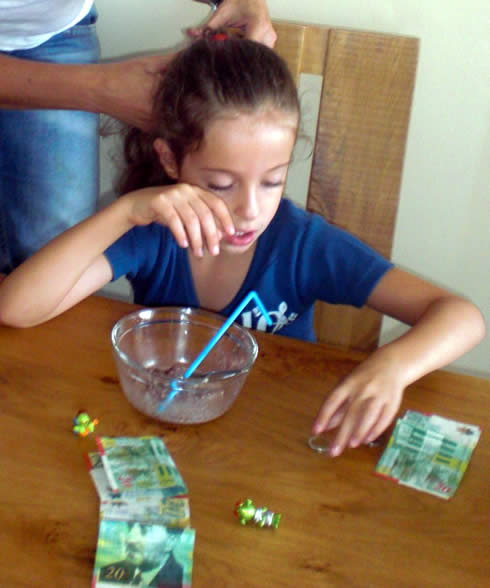 When we came back from the pool, I left the change of the 100 NIS which Efrat had given us to buy ice-cream, on the table and in the morning, while eating her cereals, Mika explored the coins and notes. So we both learnt, who was the man on the 20 Sheqel note, Moshe Sharett, and also what was written there, in the smallest of letters, from his wisdom. |
 |
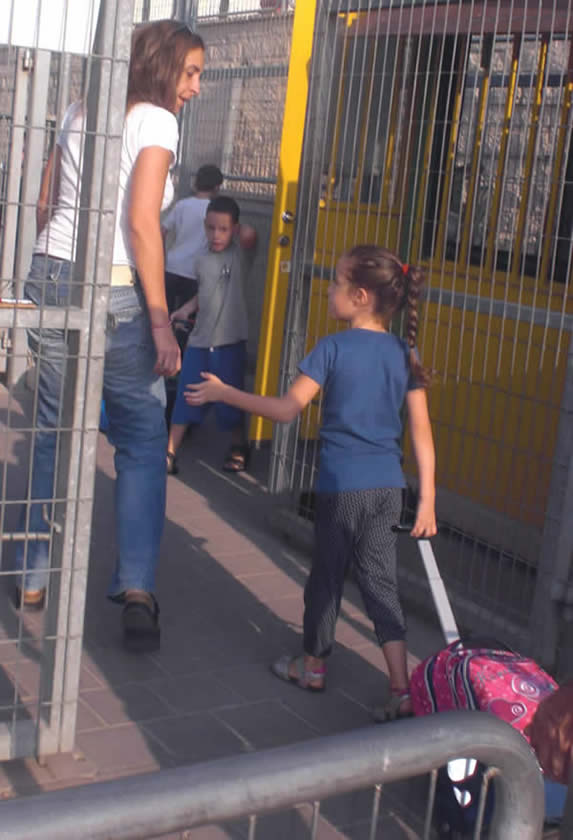 |
And just before I leave for traveling back to Arad, I once
more accompany Mika to school.
Though she didn't have nightmares concerning the pressure of responsibility
and commitment,
her face is not expressing the joy of expectation, which had filled her for
so many months....
continuation of "En-JOY-ing
and Growing with Mika and my Family" in SongGame
2007_10_28
[the
next page, Oct.26 and also the
page which follows it-Oct.27, are already dedicated to other vital themes....]

